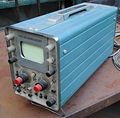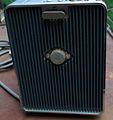321
The Tektronix 321 is a very compact single-trace, single-timebase portable oscilloscope that is almost completely solid state. It was introduced on April 8th, 1960.
The 321 includes several germanium bipolar transistors, which are a known reliability problem.
The 321A was introduced in 1964. The 321 and 321A have slightly different circuits. Early instances of the 321 (sn pre-720) use a 5718 peanut tube as the front-end cathode follower.
Later 321 and 321A use a 7586 Nuvistor for that role. Latest 321A (SN6000 up) use a FET 151-1011-01. In several circuits, the 321 uses OC170 transistors where the 321A uses 2N2207 transistors.
Specifications
please add
External Power Connector
Douglas W Jones, wrote:
I've got a Tektronix 321 scope [serial number 001917] that I need to run from an external DC supply. The problem is, I have only the line cord, and not the DC cord. The power input plugs on the scope are obviously custom, long predating the standard IEC plug everyone uses today.
So I improvised. The pin spacing for the 3-pin DC input plug is very close to the spacing of Molex 6, 9 and 12-pin plugs, and the pin diameter is not too much larger than Molex uses. So, I picked up a 6-pin Molex housing and 3 female molex pins, and then cut the housing down to 4 pins (using my pocket knife).
I used an old IEC cord for the DC input wires, with the plugs cut off both ends. I attached the wires on one end to the molex pins and pushed them into the housing, then jammed to housing down onto the Tektronix connector (this flared the female Molex pins to fit the Tektronix pins. The other end of the DC power cord got banana plugs to fit the output posts of my DC power supply.
The net result works fine, plugs and unplugs nicely, and unlike other power supply solutions I've seen, involves no changes to the scope.
-
Douglas W Jones' 321 Power Cable
Pictures
-
321 front view
-
321 right case
-
321 left internal
-
321 right internal
-
321 rear view
-
321 with round bezel
-
Latest 321A´s frontend.








